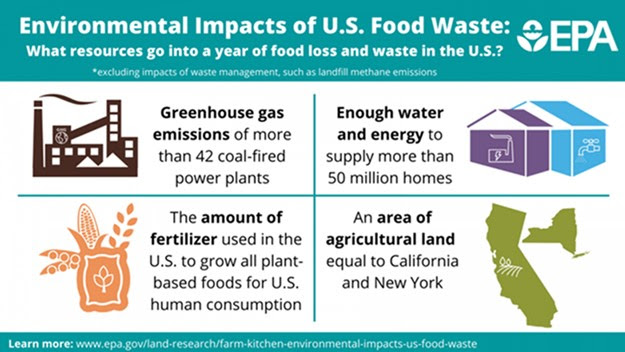
We’re pleased to share with you the newly released EPA report, “From Farm to Kitchen: The Environmental Impacts of U.S. Food Waste (Part 1).” This report reveals the climate and environmental impacts of producing, processing, distributing, and retailing food that is ultimately wasted and projects the environmental benefits of meeting the U.S. goal to prevent 50 percent of food waste by 2030.
A companion report, “The Environmental Impacts of U.S. Food Waste: Part 2,” will examine and compare the environmental impacts of a range of management pathways for food waste, such as landfilling, composting, and anaerobic digestion. We plan to complete Part 2 in Spring 2022. Together, these two reports encompass the net environmental footprint of U.S. food loss and waste.
Below are some key takeaways from the new report:
- Each year, the resources attributed to U.S. food loss and waste are equivalent to:
- 140 million acres agricultural land – an area the size of California and New York combined;
- 5.9 trillion gallons blue water – equal to annual water use of 50 million American homes;
- 778 million pounds pesticides;
- 14 billion pounds fertilizer – enough to grow all the plant-based foods produced each year in the United States for domestic consumption;
- 664 billion kWh energy – enough to power more than 50 million U.S. homes for a year; and
- 170 million MTCO2e greenhouse gas emissions (excluding landfill emissions) – equal to the annual CO2 emissions of 42 coal-fired power plants.
Significant resources go into growing, processing, packaging, storing, and distributing food. The most important action we can take to reduce the environmental impacts of uneaten food is to prevent that food from becoming waste in the first place.
We hope you find this report useful and informative. Please share it with your networks.
For questions, contact Shannon Kenny (Kenny.Shannon@epa.gov), Senior Advisor, Food Loss and Food Waste, U.S. EPA Office of Research and Development. To learn more about sustainable management of food, visit https://www.epa.gov/sustainable-management-food.
